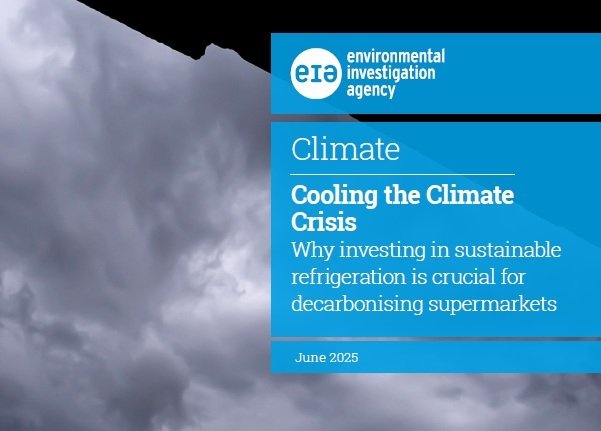The Environmental Investigation Agency (EIA) has published a comprehensive report urging supermarket retailers worldwide to transition away from hydrofluorocarbon (HFC)-based refrigeration and adopt sustainable cooling technologies. The report,
Cooling the Climate Crisis (June 2025), highlights the environmental and financial risks associated with continued reliance on HFCs and outlines a clear pathway to achieving Net Zero emissions from cooling.
According to EIA, supermarket cooling systems—used in refrigeration, distribution, and transport—are responsible for up to 70 per cent of Scope 1 and 2 greenhouse gas (GHG) emissions in the sector. These emissions come from both the high energy consumption of cooling equipment and refrigerant leakage. In 2024, global temperatures reached a record 1.55°C above pre-industrial levels, and cooling systems contributed to around seven per cent of total GHG emissions.
The report analyses the practices of five major European supermarket groups: Ahold Delhaize, Carrefour, Jerónimo Martins, Metro AG and Tesco. It reveals a wide disparity in progress toward HFC-free operations. For instance, Germany’s Metro AG has committed to reducing 90 per cent of HFC usage by 2030 and achieving a full phase-out by 2040, with over half of its stores already converted to natural refrigerants. Portugal-based Jerónimo Martins has also made significant strides, particularly in Colombia, where more than 97 per cent of its stores now use propane-based plug-in units. The company plans a complete HFC phase-out by 2035.
By contrast, Ahold Delhaize—despite being a major retailer in both the EU and US—has been criticised for high refrigerant emissions and limited disclosure on its cooling transition plan. In 2023, the company reported 2.16 million tonnes CO2e in cooling-related Scope 1 and 2 emissions, the highest among the retailers analysed. Carrefour, while offering detailed cost estimates for converting its 406 European hypermarkets (€650 million), still reports high levels of HFC use and allocates the lowest share of capital expenditure (4.3 per cent) to sustainable cooling. Tesco, which has pioneered natural refrigerants in transport refrigeration, has withheld key data in recent disclosures.
The EIA emphasises that natural refrigerants such as CO2, ammonia, and hydrocarbons offer a viable and increasingly cost-effective alternative. Case studies show strong financial returns: Carrefour and Jerónimo Martins reported payback periods of 4–10 years on investments in natural refrigerant systems, with annual emissions reductions of over 75,000 tonnes CO2e. Further savings are achieved through efficiency measures like adding doors to fridges—yielding energy reductions of 19–45 per cent—and integrating heat recovery or solar energy.
The report also highlights regulatory pressure in Europe. Under the EU’s 2024 F-gas Regulation, a complete HFC phase-out has been mandated, alongside stricter disclosure and sustainability requirements through the Corporate Sustainability Reporting Directive (CSRD) and the Corporate Sustainability Due Diligence Directive (CSDDD). Retailers face potential penalties of up to five per cent of global turnover for non-compliance.
To guide the industry, EIA proposes a Net Zero Supermarket Cooling Pathway structured around four pillars: transparent data disclosure, refrigerant phase-out, energy efficiency, and supply chain engagement. The roadmap urges all retailers to commit to HFC-free cooling in EU stores by 2030 and globally by 2040. It also calls for annual investment of at least six per cent of capital expenditure in low-GWP cooling systems and active engagement with suppliers to decarbonise cold chain logistics.
“Cooling-related emissions represent a major share of supermarkets’ carbon footprint, ranging from 36 per cent to 70 per cent of Scope 1 and 2 emissions for the retailers analysed,” the report concludes. “Retailers must act now to reduce emissions, avoid stranded assets, and align with 1.5°C climate targets.”
